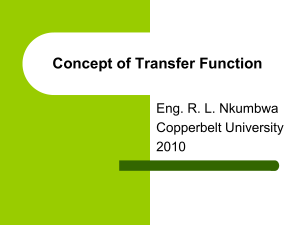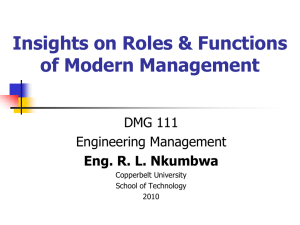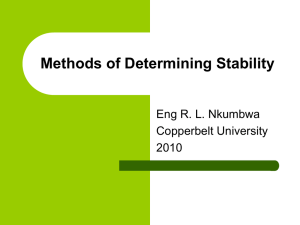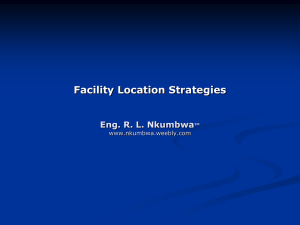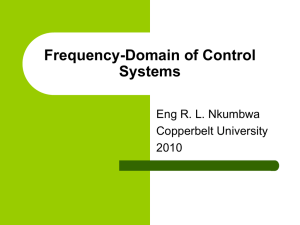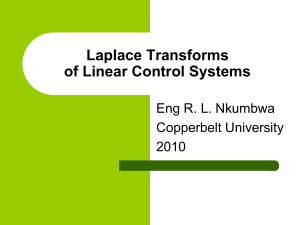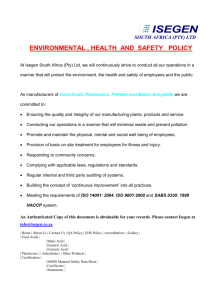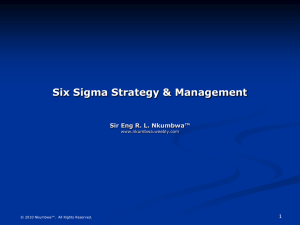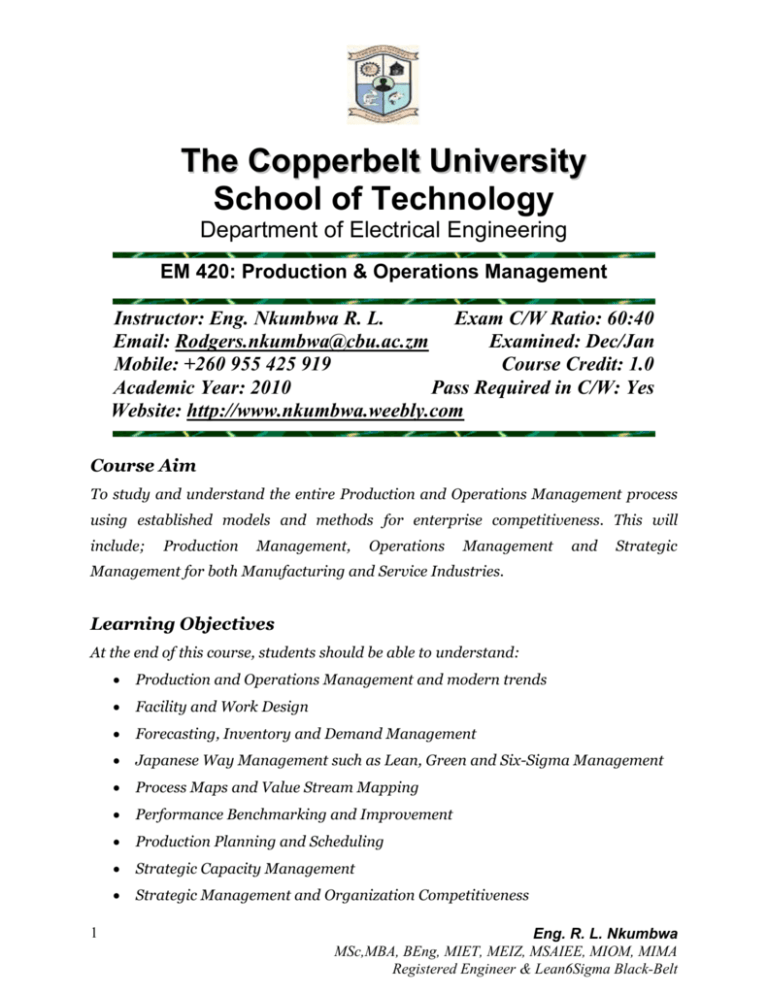
The Copperbelt University
School of Technology
Department of Electrical Engineering
EM 420: Production & Operations Management
Instructor: Eng. Nkumbwa R. L.
Exam C/W Ratio: 60:40
Email: Rodgers.nkumbwa@cbu.ac.zm
Examined: Dec/Jan
Mobile: +260 955 425 919
Course Credit: 1.0
Academic Year: 2010
Pass Required in C/W: Yes
Website: http://www.nkumbwa.weebly.com
Course Aim
To study and understand the entire Production and Operations Management process
using established models and methods for enterprise competitiveness. This will
include;
Production
Management,
Operations
Management
and
Strategic
Management for both Manufacturing and Service Industries.
Learning Objectives
At the end of this course, students should be able to understand:
1
Production and Operations Management and modern trends
Facility and Work Design
Forecasting, Inventory and Demand Management
Japanese Way Management such as Lean, Green and Six-Sigma Management
Process Maps and Value Stream Mapping
Performance Benchmarking and Improvement
Production Planning and Scheduling
Strategic Capacity Management
Strategic Management and Organization Competitiveness
Eng. R. L. Nkumbwa
MSc,MBA, BEng, MIET, MEIZ, MSAIEE, MIOM, MIMA
Registered Engineer & Lean6Sigma Black-Belt
Outline Syllabus
1.0
Introduction to Production and Operations Management
1.1
Introduction
1.2
Production Management
1.3
Operations Management
1.4
Strategic Management
2.0
Facility Location Strategies
2.1
Importance of Location
2.2
Location Factors
2.3
Costs Analysis
2.4
Factor Rating Methods
2.5
Methods of Solving Location Problems
2.6
Plant Layout Design
3.0
Job Design, Work Measurements and Labour Standards
3.1
Job Design
3.2
Work Measurement
3.3
Labour Standards
4.0
Forecasting, Planning and Scheduling
4.1
Forecasting
4.2
Production Planning
4.3
Production Scheduling
4.4
Material Resource Planning (MRP)
4.5
Enterprise Resource Planning (ERP) i.e. Oracle, SAP, etc
4.6
Material Handling and Automated Guided Vehicles
5.0
Japanese Way Management Strategies 1
5.1
Introduction
5.2
Lean Manufacturing
5.2.1 Kanban - Only Produce or Deliver Services on Demand
5.2.2 Heijunka - Level Organization Workload
5.2.3 Andon - Build Problem Intelligence to Improve Quality
5.2.4 Jidoka - Build Facility Intelligence to Improve Quality
5.2.5 Seiketsu - Use Standardized Work and Procedures
5.2.6 Kamishibai - Use Visual Screens in Work Environment
5.2.7 Automation - Use Technology if it will Improve Work
5.2.8 Jikotei Kanketsu - Create Business Reform Department
5.2.9 Sensei - Grow experts to live the vision and edify others
5.2.10 Yokoten - Grow and Edify Value Chain Partners
5.2.11 Genchi Genbutsu - Go See Yourself and Understand
5.2.12 Nemawashi – Consider all Options and Execute Swiftly
5.2.13 Hansei – Mirror, Reward Performance and Learn
5.2.14 Keiretsu – Create Industry Association for Synergy
5.2.15 Kaizen – Challenge the Status Quo
5.2.16 Six-S Campaign & Cellular Manufacturing
1
To be taken by Eng. NKUMBWA in Electrical Engineering Department, that is the whole chapter five only.
2
Eng. R. L. Nkumbwa
MSc,MBA, BEng, MIET, MEIZ, MSAIEE, MIOM, MIMA
Registered Engineer & Lean6Sigma Black-Belt
5.2.17 Single Minute Exchange of Die (SMED)
5.2.18 Muda – Eliminate the Ten Orgainization Wastes
5.2.18.1 Motion
5.2.18.2 Waiting
5.2.18.3 Uncertainty
5.2.18.4 Defects
5.2.18.5 Processing
5.2.18.6 Over-Production
5.2.18.7 Inventory
5.2.18.8 Underutilized Resources
5.2.18.9 Poor Communication
5.2.18.10 Misused Resources
3
5.3
Value Stream Mapping (VSM)
5.3.1 Using Microsoft Visio for Organization Value Stream Mapping
5.4
Theory of Constraints (TOC)
5.4.1 Five Steps of TOC
5.4.2 Batch Size Problem
5.4.3 Evaporating Cloud Method
5.5
Six-Sigma Management Strategy
5.5.1 Introduction
5.5.2 Phases of Six-Sigma
5.5.3 Design for Six-Sigma
5.5.4 Green and Black Belts
5.5.5 Case Studies for Six Sigma Strategy
5.6
Statistical Process Control
5.6.1 Process Variability
5.6.2 Control Charts
5.6.3 Process Capability
5.6.4 Measurement Instruments
5.7
Performance Benchmarking
5.7.1.1
Benchmarking Methods
5.7.1.2
Manufacturing Global Competitiveness
5.7.1.3
Benchmarking Products to World Class Standards
5.7.1.3.1
ISO 9001: 2008 Quality Management Systems
5.7.1.3.2
ISO 14001: 2004 Environmental Management
Systems
5.7.1.3.3
ISO 5001: 2008 Energy Management Systems
5.7.1.3.4
ISO 18001: 2008 Occupational Health and
Safety Management Systems
5.7.1.3.5
ISO
26000:
2010
Corporate
Social
Responsibility
5.7.1.3.6
ISO 1006: 2007 Project Management Quality
5.7.1.3.7
ISO 1001: 2007 Customer Satisfaction &
Complaints Handling
Eng. R. L. Nkumbwa
MSc,MBA, BEng, MIET, MEIZ, MSAIEE, MIOM, MIMA
Registered Engineer & Lean6Sigma Black-Belt
5.7.1.3.8
ISO 28000 Supply Chain Management
6.0
Human Factors in Production and Operations Management
6.1
Ergonomics
6.2
Knowledge Management
6.3
Learning Organization
6.4
Rewards and Recognition
6.5
Safety, Health and Environment
6.6
Effective Teams
7.0
Strategic Management
7.1
Strategic Management Thinking
7.2
Customer analysis
7.3
Competitor Analysis
7.4
SWOT Analysis
7.5
Strategy Formulation
8.0
Capital Budgeting
8.1
Typical Capital Budgeting Decisions
8.2
Plant Expansion Budgeting
Course Configuration
50 Hours of Lectures/Presentations per term
Course Text Books & References
Jacobs, F. R. (2008), 12th Edition, Operations and Supply Management,
McGraw-Hill, Boston MA, USA.
Singh, S. (2000), Computer Aided Design and Manufacturing, Khana
Publishers, New Delhi, India.
Womack, J and Jones, D. Lean Thinking: Banish Waste and Create Wealth
in Organization http://www.lean.org or www.leanuk.org
Liker, J. and Maier, D. Toyota Way Management, www.toyotaway.org
Feedback to your Instructor
Your questions, comments and suggestions regarding the course content and delivery,
as well as the teaching and learning processes and related outcomes will be greatly
appreciated. For learning facilitation and the benefit of all students in the class,
selected comments and feedback (and their responses) will be published on the course
web-site (with any identifying information from the sender removed).
4
Eng. R. L. Nkumbwa
MSc,MBA, BEng, MIET, MEIZ, MSAIEE, MIOM, MIMA
Registered Engineer & Lean6Sigma Black-Belt
Student Declaration
By accepting to take this course the student agree that, the assignment (i.e. learning
activities, research, etc) submitted in this course is as a result of his/her own
investigations and that he/she has conformed to the guidelines against plagiarism as
laid by the University Academic Honesty. All sections of the text and results which
have been obtained from other sources are fully referenced using the Harvard style
(for details about Harvard see Com. Skills Lecturers). The student understands that
any means of investigation may be used to detect cheating or copying and plagiarism,
and such cheating constitute a breach of University regulations and will be dealt with
accordingly. By submitting the assignment and tests, the student agrees to be awarded
the lowest mark possible, should cheating or copying be detected. Before submitting an
assignment please make use of free online plagiarism software checker at
http://www.nkumbwa.weebly.com
Penalty for Late submission of Assignments
Unless you have submitted proof of Mitigating Circumstances or have been granted an
extension, the penalties for late submission of an assignment or missing a
GLA/presentation shall be as follows:
Up to one week late:
Penalty of 60% of marks awarded
More than one week late:
Fail – 0% recorded
Course Necessities / House Keeping
You are expected to behave in a Professional Manner
You are expected to dress-professional during all presentations
You are advised to switch off the phone during lecture hours
No unnecessary movements during lecture hours
Lectures starts promptly
Door will be closed 10 minutes after the start and not opened
Anyone arriving after then will not be admitted
This will apply to any break period
The class register will be checked, you need to attend 80%
Missing Classes without explanation will cost you heavily
Any student disrupting the lecture will be evicted
Complaints Guidelines
Complaints about the grading of the Group Learning Activity and Presentations
(GLAP) or tests should be made within one week after they are returned to you. No
score adjustments will be made after the one-week period. If you desire a regrade on
an exam, please attach a note to your exam stating which problems and the
discrepancies you found. Be sure to look at the solutions send to you before asking for
5
Eng. R. L. Nkumbwa
MSc,MBA, BEng, MIET, MEIZ, MSAIEE, MIOM, MIMA
Registered Engineer & Lean6Sigma Black-Belt
a regrade.
Academic Dishonesty Guidelines
The EM 420 faculty instructor expects every student in the EM 420 class to practice
honorable and ethical behavior both inside and outside the classroom. Any actions that
might unfairly improve a student’s score on assignments, GLAP, or examinations will
be considered cheating and will not be tolerated. Examples of cheating include (but are
not limited to):
Sharing results or other information during an examination.
Bringing forbidden material or devices to an examination.
Working on an exam before or after the official time allowed.
Requesting a regrade of answers or work that has been altered.
Submitting assignment work that is not your own work or engaging in
forbidden assignment work collaborations.
At the instructor's discretion, cheating on an assignment or examination will result in
a reduced score, a zero score, or a failing grade for the course. All occurrences of
academic dishonesty will be reported to the HoD, Dean of School, Dean of Students
and copied to the Academic Registrar. If there is any question as to whether a given
action might be construed as cheating, please see the Instructor or the HoD before you
engage in any such action.
Disclaimer
The above is just a proposed course outline and guidelines which may not be definite,
hence, the author reserves the right to alter any part or section in form of adding or
eliminating some theme without prior notice or permission from any party. Therefore,
cannot be held responsible for any failure that may arise in terms of coverage or
anything alike. It is intended to provide a detailed general guide for students self study
and excellence.
E-Mail: Rodgers.nkumbwa@cbu.ac.zm
Skype ID: enterprisevision.zm
Mobile: +260 955 425 919
©Nkumbwa2010 All Rights reserved
6
Eng. R. L. Nkumbwa
MSc,MBA, BEng, MIET, MEIZ, MSAIEE, MIOM, MIMA
Registered Engineer & Lean6Sigma Black-Belt

